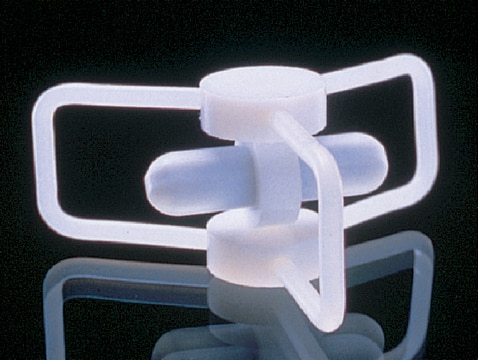추천 제품
제품명
HeLa-Mitotrap-Ap1g1-FKBP, 15042203
생물학적 소스
human cervix
설명
Human cervix carcinoma, knocksideways, rapid protein inactivation by rerouting to mitochondria for functional studies, adaptor protein (Ap1g1), genetically modified
성장 모드
Adherent
형태학
Epithelial, polygonal
기술
cell culture | mammalian: suitable
배송 상태
dry ice
저장 온도
−196°C
세포주 설명
This cell line can be used to determine the function of a protein by rapidly inactivating the protein of interest by rapamycin induced rerouting of the protein to the mitochondria.
The HeLa-Mitotrap-Ap1g1-FKBP is a stably transfected HeLa cell line expressing two proteins containing rapamycin binding activity. To generate this cell line, the HeLa-Mitotrap cell line, ECACC 15042201, expressing a single construct expressing a mitochondrial trapping protein containing an FRB domain, (the term FRB refers to protein containing a FKBP12 and Rapamycin Binding (FRB) domains within the mTOR (mammalian Target of Rapamycin) protein, has been transfected with a second construct expressing siRNA-resistant subunits, FKBP-tagged subunits of the adaptor protein (AP1) complexes of clatharin-coated vesicles (CCVs) together with an FKBP and rapamycin-binding domain with a mitochondrial targeting signal. An FKBP domain, FKBP is a cellular chaperone protein and prolyl isomerase which is a target for rapamycin binding and will dimerize with FRB-containing protein. Upon treatment with rapamycin a target protein containing an FKBP domain, e.g, AP1, will dimerize with FRB domains and sequester the resulting protein complexes to the mitochondria. Treatment of cell lines containing both FRB and FKBP rapamycin binding proteins can sequester target proteins to the mitochondria within minutes of treatment rendering the cells ready for immediate assay.
The ?-FKBP construct was based on a pIRESneo2 plasmid encoding an siRNA-resistant form of a, which includes a brain-specific insert that acts as an epitope tag (Motley et al., 2006, PMID: 17035630). The FKBP coding sequence was amplified by PCR and inserted into the linker region of ?. The open reading frame was sequenced, the plasmid was transfected into HeLaM cells, and clonal cell lines were isolated as previously described (Motley et al., 2006).
The HeLa-Mitotrap-Ap1g1-FKBP is a stably transfected HeLa cell line expressing two proteins containing rapamycin binding activity. To generate this cell line, the HeLa-Mitotrap cell line, ECACC 15042201, expressing a single construct expressing a mitochondrial trapping protein containing an FRB domain, (the term FRB refers to protein containing a FKBP12 and Rapamycin Binding (FRB) domains within the mTOR (mammalian Target of Rapamycin) protein, has been transfected with a second construct expressing siRNA-resistant subunits, FKBP-tagged subunits of the adaptor protein (AP1) complexes of clatharin-coated vesicles (CCVs) together with an FKBP and rapamycin-binding domain with a mitochondrial targeting signal. An FKBP domain, FKBP is a cellular chaperone protein and prolyl isomerase which is a target for rapamycin binding and will dimerize with FRB-containing protein. Upon treatment with rapamycin a target protein containing an FKBP domain, e.g, AP1, will dimerize with FRB domains and sequester the resulting protein complexes to the mitochondria. Treatment of cell lines containing both FRB and FKBP rapamycin binding proteins can sequester target proteins to the mitochondria within minutes of treatment rendering the cells ready for immediate assay.
The ?-FKBP construct was based on a pIRESneo2 plasmid encoding an siRNA-resistant form of a, which includes a brain-specific insert that acts as an epitope tag (Motley et al., 2006, PMID: 17035630). The FKBP coding sequence was amplified by PCR and inserted into the linker region of ?. The open reading frame was sequenced, the plasmid was transfected into HeLaM cells, and clonal cell lines were isolated as previously described (Motley et al., 2006).
배양 배지
Dulbecco′s Modified Eagle′s Medium, high glucose (DMEM) + 2mM Glutamine + 10% Fetal Bovine Serum (FBS)
계대배양 정규 작업
Trypsinise cultures at 80% confluence with 0.05% Trypsin/EDTA. Seed flasks at 2 x 104 cells/ cm2. Cultures must be incubated in a humidified 10% CO2/90% air incubator at 37oC.
기타 정보
Cultures from PHE Culture Collections and supplied by Sigma are for research purposes only. Enquiries regarding the commercial use of a cell line are referred to the depositor of the cell line. Some cell lines have additional special release conditions such as the requirement for a material transfer agreement to be completed by the potential recipient prior to the supply of the cell line. Please view the Terms & Conditions of Supply for more information.
면책조항
This cell line has special release conditions: Commercial organisations are required to complete the ′Cell Line Release Authorisation for Research Use in Commercial Organisations′ release conditions form.
가장 최신 버전 중 하나를 선택하세요:
활성 필터
자사의 과학자팀은 생명 과학, 재료 과학, 화학 합성, 크로마토그래피, 분석 및 기타 많은 영역을 포함한 모든 과학 분야에 경험이 있습니다..
고객지원팀으로 연락바랍니다.








